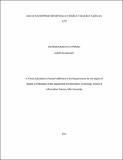USE OF ENTERPRISE REPORTING SYSTEMS AT KISII BOTTLERS (K) LTD
Abstract/
Reports have widely indicated the need for organizations to step up utilization of
electronic data through use of Enterprise Reporting (ER). In this regard, this study
sought to investigate the use of enterprise reporting at Kisii Bottlers (K) Ltd. with a
view to developing a solution to enhance the use of enterprise reporting in the company.
The objectives of the study were; to assess the extent of use of enterprise reporting
systems at Kisii Bottlers (K) Ltd., to identify the challenges experienced in the use of
enterprise reporting systems, to determine appropriate Key Performance Indicators and
Service Level Agreements that can be tracked to enhance use of enterprise reporting
systems, to assess the benefits of systematic tracking of the identified Key Performance
Indicators and Service Level Agreements in the use of enterprise reporting systems and
to design and develop a systematic supervision reporting system to enhance use of
enterprise reporting systems. The research was guided by systems theory, whereby
Enterprise Reporting systems were regarded key components of the integrated
enterprise information systems of a typical company. Case study method was employed,
and data was collected through the use of interviews. Purposive sampling was used to
get a total of forty two (42) respondents, drawn from business and IT functions of the
organization. Those interviewed included; Two (2) professionals in the IT services
provision category, ten (10) business managers and thirty (30) operational level
employees. Thematic analysis method was used to analyze responses obtained through
interviews. Findings revealed that reports were the most commonly used electronic
information resources for management decision-making. However, respondents were
dissatisfied with the level of use of reporting in the company but appreciated the role
that Enterprise Reporting could have in decision making, underscoring the impact that
use of Enterprise Reporting could have on management decision making. The factors
that were revealed as being influential in the overall status of the use of ER systems
include; report design and development, report generation, report distribution, report
review and revision. It was concluded that utilization of electronic data through
Enterprise Reporting could be improved through systematic tracking of the measures
related to the influential factors in the use of Enterprise Reporting systems, to help
relevant persons take appropriate and timely steps to deal with challenges. A
supervision reporting system was designed and developed to track the use of reporting
systems in the company

